- Home
- Robin McKinley
Pegasus Page 2
Pegasus Read online
Page 2
They wish their lives—and their Caves, which appear to bee thee chief manifestation of their recollection. But thee Caves lie many days’ journey farther into thee mountains that steeply rise from these lush and fruitful plateaus we humans desire; Gandam says he is middling sure human feet could not take us there besides, and we have not wings. Balsin laughs and says, Good: that he wants all human forces to bend themselves to thee palace he already has in his mind’s eye to build upon thee greatest of these plateaus. It is his own consort, Badilla, who has begun to measure thee landscape for this building; she was trained for such work in thee old countrie, although Balsin says he married her for her beauty. My own Sinsi says she wishes only to finish thee job of securing our new land from its enemies; that what she most wants is to see her belly growing too large for its battle leathers, and a safe place where our babies may play.
The first song Sylvi could ever remember hearing was about the pegasi. Her nurse used to sing it to her when she was a baby, and would then “fly” her around the room. The tradition was that Viktur’s wife, Sinsi, had written it for their children, although no one knew for sure.
Oh hush your crying
Your friends come flying
In the plumes of their wings
The south wind sings
The treaty was written by human scribes and depicted or portrayed by some makers and devisers among the pegasi upon thick supple paper made by the pegasi:
Balsin would have it bee parchment, but thee pegasi demurred, that they did not use thee skins of beasts for such or any purpose, and proffered their finest made paper instead, which is very beautiful, with a gloss to it not unlike thee flank of a pegasus, and faint glints of colour from thee petals of flowers. Dorogin did not like this however, and said there was magic pressed into its fibres, but Gandam held his hands over it and said thee only magic was that of craftsmanship, and as Gandam was thee senior, Dorogin must needs give way; and Balsin looked at Gandam and nodded, and Dorogin looked as if he had swallowed a toad.
Sylvi gave a little hiccup of laughter; the toad wasn’t in the schoolroom copy of the annals either. But reading of Gandam in the beginning always made her sad, because of what happened to him after. She’d never liked Dorogin; he was one of those people who always wanted everything his way.
The signing of the treaty was interrupted by an incursion of their enemies, taralians tearing at them from the ground, ladons, wyverns and norindours soaring overhead to dive and slash from above: “It is a new sort of fighting we must learn,” wrote the second commander, “for we have but rarely known aerial enemies ere now.” But learn it they did; and drove off the attackers with arrows and spears, and any of the winged company who fell to the ground were dispatched with sword and brand.
“Balsin is the worthiest commander of this and perhaps any age, so I do believe,” wrote Viktur. “And it is my honour to serve him. But it has seemed to me in this battle that he is something almost more than human, and that none and nothing can stand against thee Sword he carries, which he won from its dark guardian many years ago, when he was but a young man, as if for this day.”
Balsin called for the treaty to be signed during a lull in the battle: “It will hearten us,” he said, which was another of those phrases the citizens of the country he founded were still saying almost a thousand years later. There was a seal that had been struck by Balsin’s great-grandson which the sovereign still used, which said It will hearten us around the edge, coiled around a heart with a sword through it, which Sylvi thought looked more disheartening, but it was used for things like trade agreements and mutual defence accords, so presumably it looked friendly to delegates and ambassadors.
And so a table was set up, and Balsin and Viktur and some of the most senior of the company commanders and their aides and adjutants and Gandam and Dorogin and another magician named Kond stood on one side, and the pegasus king, Fralialal, and several pegasi with him, stood on the other side, and the gleaming paper with the treaty written upon it lay between them. The pegasi had agreed to signing, once the concept had been explained to them; the treaty was also ratified by pegasus convention in an exchange of tokens. Viktur wrote,
Balsin had chosen thee opal he had long worne as not merely thee most valuable thing any of us carried—save perhaps thee Sword—but as thee greatest heirloom of his own family. Thee chain it did hang upon however was of a length for a human throat not that of a pegasus, and because Balsin knew of thee pegasi’s aversion to leather, we had had some dismay in how to make up thee difference, for our army was much blessed with spare straps but little else of that nature. My Sinsi it was who first unbound her hair and offered thee ribbon that had held it, which was of red silk, and perhaps not too low a thing for such a purpose; and then several more of our folk did thee same, both man and woman, and Gandam did plait them together and perhaps he did say some words over them, to make them more fine and stalwart.
Sinsi said ruefully, holding her long hair in both hands as thee wind tugged at it, I do not like leather strings in my hair, but it is that or that I shall cut it off; and as I did protest she laughed and said, then it must be thee leather, alas—and she then made a noise more suitable to a common soldier than a blood and commission bearer.
But at thee ceremonie thee pegasus queen did come to her, and to those others who had given up their hair-ribbons, and offered to them instead ribbons of shining filaments in plaits so daintily coloured that our dull human eyes saw them change hue as thee light upon them did change; and Sinsi and thee others did twist them through their hair, and were happy indeed. One of these would truly have been token enough, but thee pegasus king set something else round our Balsin’s neck—although when I say thee king did, in truth there were three, for while their wings are powerful beyond our imagining, thee hands of thee pegasi are but tiny claws at thee leading bend of thee wing where some birds do seem to have thumbe and first finger, and these hands have little strength nor flexibility; it is a wonder thee pegasi do with them as much as they do, for their weaving is a wonder and an astonishment.
Thee thing thee king gave was little to behold at thee first: a plain brown cord strung with large wooden beads of a paler brown. We understood by then however that thee pegasi by choice lead simple lives and I think none of us feared that thee pegasi sought to insult us, or did not honour thee treaty; perhaps thee beads were made of a wood significant to them, as Gandam wears an ear-ring that looks like rusty iron.
As Balsin had had some trouble making up thee length of chain for thee neck of a pegasus, thee pegasi had perhaps ill judged thee smallness of thee human throat, and thee necklace of beads lay more upon Balsin’s stomach than his breast. He looked down at thee beads as if mildly puzzled, and I, standing near, thought only that he wondered at thee plainness of thee gift; but then he held his hand in such a way as to forbear thee sunlight which did fall upon them, and I caught my breath for then I saw thee marvel of them: these beads do shine with their own light, as if they were scooped out of thee margin of thee sunne—or rather of thee moon, for it is a soft and kindly light.
All of this was in Sylvi’s school-book copy of the annals—as the necklace, the treaty and the Sword hung upon the wall of the Great Hall of the palace—but she read on. She couldn’t remember ever not knowing the story of the treaty and the Alliance; by the time she could read about it for herself it was already familiar, as were the Sword and the tokens in her life outside the schoolroom. But books from a printing press were in anonymous black type and bound in plain fabric and board; this little leather-bound book, soft and slippery with use and age, and the extra effort needed to decipher the second commander’s handwriting—and his occasionally curious spelling—made her feel as if she were reading the story for the first time.
She remembered Ahathin standing, and the guards. “I’m sorry,” she said, looking up. “It’s different, reading it here. I’ll stop now.”
“Good that it’s different. Don’t stop.”
She went on looking at him. “Then you have to sit down.”
He blinked at her, amused. “As the Lady Sylviianel wills. Er—if the Lady Sylviianel permits, I will leave her to consult with the librarian on another matter.”
Sylvi looked at the guards, who were staring expressionlessly over her head. She wasn’t going to get them to sit down. “You couldn’t take them with you?”
“Certainly not. They remain to attend you.”
Sylvi sighed. “Then the Lady Sylviianel grants the Worthy Magician’s request.” And she went back to the second commander’s journal.
Then was thee signing.
Thee pegasus king signed first: with thee inked tips of his first three primaries, which do make a graceful, precise arc across thee bottom of thee page, like thee brushstrokes of a master painter. Afterward he raised his wing, and thee black ink had bledde farther into thee pale feathers, for he is of a creamy golden colour, and he held this up as if thee stain were itself an emblem of our Alliance, while thee gold-bound opal that was Balsin’s token gleamed at his breast.
There was a mural in the Great Hall, next to the treaty itself and opposite the wall where the Sword hung, of King Fralialal holding his black-edged wing up over the paper he has just signed. The human figures, the other pegasi, the landscape and all else fade into the background: only the pale gold pegasus, the stain on his wing, and the shining whiteness of the treaty stand out—and of these it is the wing that draws the human onlooker’s eye, that makes the wingless human shoulder blades itch. At night, by candle- and lamplight, it was easy to imagine that his one raised foreleg was in preparation for stepping down off the wall. When Sylvi was younger, and more all-encompassingly awed of the Great Hall, she had got so far as to hear the sound his hoofs made as he took his first steps on the floor—and the rustle of his wings.
Our leader had chosen to mark his witness second, as it is thee pegasi who welcome us to their land, and their king did offer ours—whom I must now learn to call king, for thee first king of our new land is he—one of his own feathers for this purpose, once he understood that we use quills to hold ink: and it was of great interest to all us humans who watched, thee elegant way thee pegasus king drew his bent wing through his teeth and plucked out a feather as gracefully as a dancer moves through a dance, or a warrior draws a sword from its sheath. We cannot refrain from looking stiff and clumsy beside thee pegasi, and I saw at last thee wisdom of our king in declaring that we should attend thee signing of thee treaty in our armour and with our swords at our sides, despite thee look of peril and chanciness this gives us, and all of us well aware of thee scouts posted all round us, for these appurtenances of war gave us dignity where we had no beauty.
But as our king bent down to sign this first and needful manifestation of his kingship, a breeze arose, and ruffled thee hair of thee humans and thee manes of thee pegasi, and blew across thee slender cut tip of thee feather penne, and thee finest spray of ink fanned over thee bright, exquisite paper, crossing thee pegasus king’s signature with a maculate crescent as beautiful as we are not, as if thee local wind gods were blessing our compact. Our king laughed, and said, quietly, that only those of us standing close enough to see what had happened could hear him, It is a pity to spoil it as we ourselves spoil thee panorama, and then bent again and signed, neatly, where thee keystone of thee arch would be, were it of stones and not ink-spots. His is not commonly a tidy signature, and thee story has gone round that he signed against his will; but it is not that and I have countered thee tale wherever I have heard it. And indeed, loyal friend as I have ever been to Balsin from thee days when we were keeping thee king’s peace in thee backmost of beyond with three soldiers and a lame dog, I never liked our king so well as I did at that moment, for I understood that he too understood that to save their lives, thee pegasi have invited uncouth ruffians to dine at their high table, off their finest damask, with golden goblets and plates of silver.
Sylvi, at this point in the story, who often felt like an uncouth ruffian on those occasions when she was commanded to put on her princess manners and her princess dress and sit at court or table with her parents, always felt a pang for those first humans learning to live beside the pegasi. She sighed and stretched and pushed herself away from the table and its slight, precious burden. She didn’t want to read any more; after this there was too much war, and Gandam began to go mad. She very, very carefully closed the little book, and looked round for her worthy magician.
CHAPTER 2
Eight hundred years before, the pegasi marched (and flew) with their new allies to engage the forces assembled against them, but they were not much good at fighting. They are astonishingly nimble in the air and can splinter an enemy’s wing with a well-aimed kick, and a blow from a pegasus wing can break a norindour’s back; but they are too small and too lightweight for close work. And, as Balsin said after the first battle, while no one could doubt their courage, they aren’t devious enough. It was the human swords and spears, arrows and maces, with help from human magicians’ wiles, which won the war. The ladons and wyverns were killed or driven right away, and those who fled perhaps went in search of their larger and even more dangerous cousins, the dragons; if so it was a long search, for they were not seen again for generations. A few taralians and norindours fled into the wild lands beyond what Balsin declared were his kingdom’s boundaries, and there they were allowed to remain, so long as they caused no trouble beyond the theft of an occasional sheep; although the striped pelt of an unusually large taralian was a highly-regarded heirloom in a number of baronial families, and the sharply-bent wings of the norindour appeared on a number of family crests, as indicating courage and ferocity in all forms of struggle and combat.
While this was not in the original treaty, the humans’ superiority at warfare came slowly to be reflected in all relations between the two species, but the pegasi, mild and courteous, never gave any indication that they resented this. By Sylvi’s day, the ruler of the pegasi had for many generations been expected to do ritualised homage to the ruler of the humans on feast days, and to attend the royal court, with a suitable entourage of attendant pegasi, often enough to be seen as a regular presence. Some human rulers were greater sticklers about frequency than others, just as some pegasi rulers appeared to enjoy the visits, or appeared not to, more than others. But it was quickly noted that the more often the pegasi visited the human palace, and the more of them who did so, and the longer they stayed, the more the country ruled by the human monarch appeared to thrive.
Balsin himself had predicted something of the kind. Viktur wrote,
Balsin does strongly hold that we do hold our sweet green land by favour and sanction of thee pegasi, and as it is, so far as we do know, thee only land that do so hold pegasi, in some manner and disposition do thee pegasi hold thee land. Gandam agreed to this with great solemnity and declared that Balsin showed great wisdom for a warrior-king; and Balsin laughed and said that Gandam was an old worrymonger and that magicians see spears when warrior-kings see blades of grass. Gandam, who commonly did laugh at Balsin’s teasing did not in this instance but said instead, king, this land is beautiful but strange and we as yet understand it little; and forget not thee story of thee six blind men and thee Oliphant. Then did Balsin understand that Gandam spoke in all seriousness, and said, very well, I shall make it easy for those who come after us to remember that we hold our mandate from thee pegasi: and he with Badilla did create thee emblem of thee crowned pegasus which do appear upon thee banner that do goe with him on every occasion when thee king do ride out over his lands, in war or in peace, and which withal appears at thee peak of the arch into thee Great Hall where hangs thee Sword, and in divers places about thee palace.
But Balsin’s coat of arms showed only the Sword and the palace and the Singing Yew.
Furthermore the human sovereign, and certain of the sovereign’s extended
family, were each assigned an individual pegasus, as a kind of ceremonial companion, as if such blunt discrete pairings might ease or soften the lack of communication between the two peoples. Most of these couples saw, and expected to see, each other rarely: those humans who did not live within the Wall might not see their pegasi from one year to the next. For the sovereign’s immediate family it was different: those pegasi were often at the palace, and something like a relationship sometimes grew up between human and pegasus. There was genuine friendship between Sylvi’s father and his pegasus, who was the king of his people, and, it was said, they could almost understand each other, even without the services of the human king’s Speaker.
Some form of Speaker—of translator—had been obviously necessary from the beginning; the human magicians and pegasus shamans were the only ones who could speak across the species boundary at all. Even the sign-language, as it was developed, was unreliable and prone to misinterpretation, because of the enormous differences in anatomy between the two peoples. At first it had merely been that anyone on either side who seemed to have some talent for it learnt what they could, and the numbers of magicians and shamans were about equal. But the magicians seemed slowly to take the charge over, echoing—or perhaps going some way to causing—the tendency that in all things the humans should be superior and the pegasi should defer. The idea of the bound pairs had been Gandam’s; the idea of the Speakers, magicians specially trained to enable what communication there was between human and pegasus, was Dorogin’s. It had been Dorogin’s idea also that the sovereign, the sovereign’s consort and the sovereign’s children should each have an individual Speaker as each was bound to a pegasus.

 Spindle's End
Spindle's End The Door in the Hedge: And Other Stories
The Door in the Hedge: And Other Stories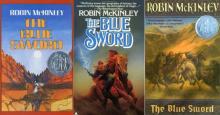 The Blue Sword
The Blue Sword Rose Daughter
Rose Daughter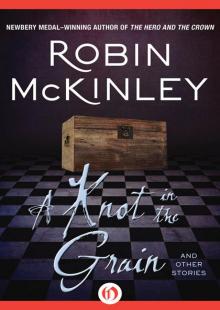 A Knot in the Grain and Other Stories
A Knot in the Grain and Other Stories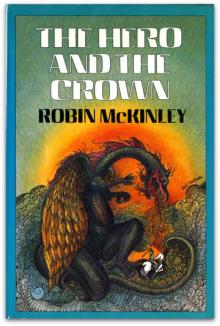 The Hero And The Crown
The Hero And The Crown Deerskin
Deerskin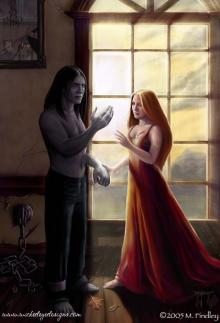 Sunshine
Sunshine Beauty: A Retelling of the Story of Beauty and the Beast
Beauty: A Retelling of the Story of Beauty and the Beast Shadows
Shadows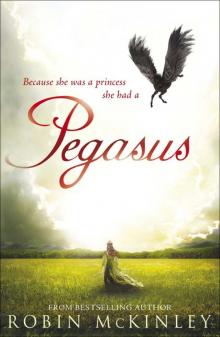 Pegasus
Pegasus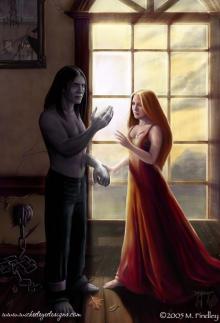 Chalice
Chalice The Outlaws of Sherwood
The Outlaws of Sherwood Fire: Tales of Elemental Spirits
Fire: Tales of Elemental Spirits Beauty
Beauty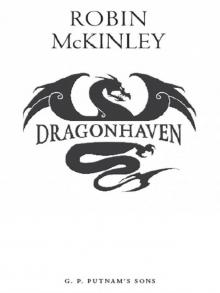 Dragon Haven
Dragon Haven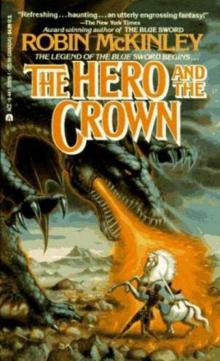 The Hero And The Crown d-2
The Hero And The Crown d-2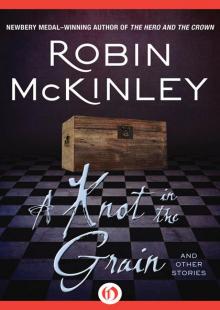 A Knot in the Grain
A Knot in the Grain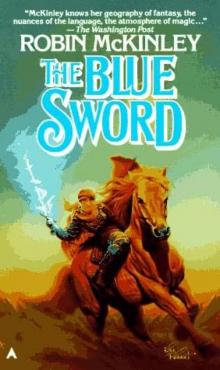 The Blue Sword d-1
The Blue Sword d-1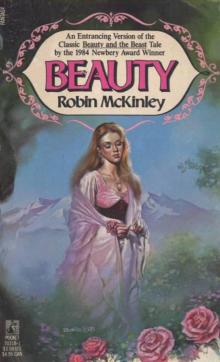 Beauty (v1.2)
Beauty (v1.2) The Door in the Hedge
The Door in the Hedge